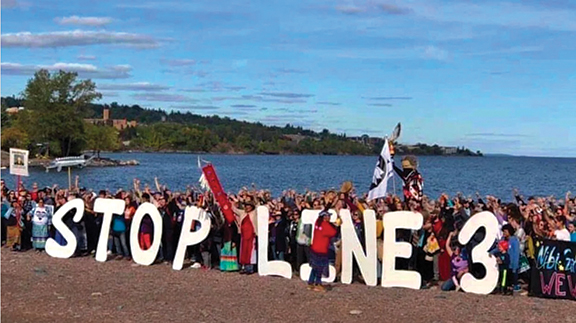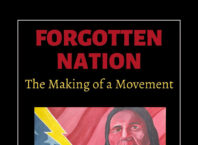
By Winona LaDuke
Governor Walz has just issued all the state permits for Enbridge’s Line 3. That’s including the Minnesota Pollution Control Permit called the 40l permit, which approves the water crossings on the Mississippi, Willow, Crow Wing and other rivers in the heart of Anishinaabe territory. And the Governor’s Department of Natural Resources issued all permits, including one which allows Enbridge to kill endangered species, and then pay Minnesota $2,532,860 for the destruction of endangered species in the line of the pipeline.
There is no bonding for tribes, no protection for our wild rice and no justice.
Then there’s the pandemic. This is a legacy Walz will have to deal with – shoving a pipeline down our throats during a pandemic for, in the end, 23 jobs. What’s clear is that all permits have been issued. The Governor should issue a stay in construction, to protect Minnesota and our people. There’s no urgency in a pipeline project.
To be clear, COVID is in an exponential growth period, and the counties along the proposed pipeline route, many of them with higher populations of Native people, are at risk. This is what exponential growth looks like: In Minnesota, our first 1,000 dead came by May 30 (a 4-5 month period), our second 1,000 dead came by Sept. 26 (a 4 month period), our third 1,000 deaths came by Nov. 18 (a 7.5 week time frame), and if trends continue, we’ll hit 4,000 dead before year’s end.
Native people are at very high risk in the corona virus pandemic. An analysis by U.S. News & World Report indicates that Native Americans have the highest racial disparity when it comes to COVID-19 hospitalizations of any group in the US. Native Americans are 5.3 times more likely to be hospitalized due to COVID-19 than white Americans. The inquiry shows that in 23 of the 31 states studied, Native Americans were at greater risk for COVID-19 infection.
In Arizona, Mississippi , Montana, New Mexico and Oregon, Native Americans were more than four times more likely to contract the disease. We would prefer to not be studied after death, and instead request that you support our lives. We have already lived through small pox and influenza epidemics. And we should not be subjected to a state sanctioned expansion of the COVIC pandemic.
Now that all approvals have been issued, Enbridge is unrolling 4200 workers in the territory of the Minnesota Chippewa tribe, into trailer parks, RV sites, hotels, and on site man camps. All of those workers pose a threat to the health and wellbeing of the Anishinaabe and to the people of this state.
We note particularly that the Enbridge pipeline route is also a route of significant COVID impacts. We also note a number of cases in western states where Pipeline workers and camps have increased the COVID rates and exposure with itinerant workers.
Health Care Capacity
Health Care professionals are deeply concerned about the raging pandemic. Health care professionals from Aitken county have called on the Governor to put a stay on the construction, noting that Aitken County has only four ICU beds, and a significant high risk population of Native and elderly residents. Cornerstone Nursing and Rehab in Bagley called on the National Guard the third week of November to support their diminished staff.
Duluth hospitals are at risk, Bemidji and more. Indian Health Service is not equipped for a pandemic.
Minnesota is seeing increased community spread among health care workers. The Minnesota Hospital Association noted a Nov. 11th spot check of their system showed “over 6,000 of our frontline health care heroes were out of service in our hospitals.” Bed counts mean nothing without qualified staff. Meanwhile, Children’s Hospital is similarly impacted, with Dr. Marc Gorelick reporting that over 200 Children’s Hospital of Minnesota staff were affected. Our tribal health care systems are already stressed, and this pandemic should not be expanded for the benefit of a Canadian multinational which has put our state and people at risk for fifty years.
The Public Trust Doctrine
Walz’s permits are a puzzle in a time when tar sands economies are collapsing, and when no other state has approved a pipeline project. Michigan Governor Gretchen Whitmer revoked the 1953 easement that allows Enbridge to operate pipelines through the Straits of Mackinac. That is also the heart of Anishinaabe territory. Governor Whitmer acted under the state’s public trust doctrine, which requires state authorities to protect the Great Lakes.
“Enbridge has routinely refused to take action to protect our Great Lakes and the millions of Americans who depend on them for clean drinking water and good jobs,” Governor Whitmer said in a statement.
In 2010, Enbridge’s Kalamazoo oil spill occurred sending 850,000 gallons of tar sands oil into the water. The spill had continued for l7 hours before it was noticed by Enbridge. Minnesota actually had the largest oil spill in US history, and it was an Enbridge spill in Grand Rapids. Seems like someone should have a memory.
Elsewhere, the tar sands industry is collapsing and in other states, like New York (Constitution pipeline), projects are being cancelled for economic reasons. In turn, the Bad River Band of Anishinaabe has rejected Enbridge’s continued use of an easement, now over 50 years old, and asked that Enbridge remove the l3 miles of pipeline crossing that reservation.
It’s baffling that Governor Walz would approve this pipeline in the face of the poor economic forecast for tar sands oil, and the fact that Enbridge has already cut through and put in the line by 400,000 barrels per day, and moved the equivalent of any new proposed line into other pipes. More than that, the state, and tribes have appealed all the Public Utilities Commission decision (an agency which needs to be entirely rebuilt).
While Governor Walz has stated that he intends to follow the science and the process, allowing all construction and water crossings to be completed prior to a Court hearing is a hollow promise. The state and our tribes have yet to have our day in the Minnesota Court of Appeals, where we have challenged this pipeline in terms of the Certificate of Need and the Route.
This pipeline during a pandemic is a disaster for the state and for our people. This is not an essential pipeline project by any means, and Walz’s legacy will be tarnished by the deaths resulting from this project.
In the end this pipeline, according to Enbridge, will leave 23 new jobs. Those jobs are conflict jobs, born of a battle, dividing your state, and adding a huge carbon footprint in a time of climate disaster.
Governor Walkz, we understand your commitment to labor and jobs, and respectfully request that you look beyond a dirty pipeline during a pandemic, and make instead, a legacy of hope, courage and well being for all of our people. Please issue a stay on construction.






